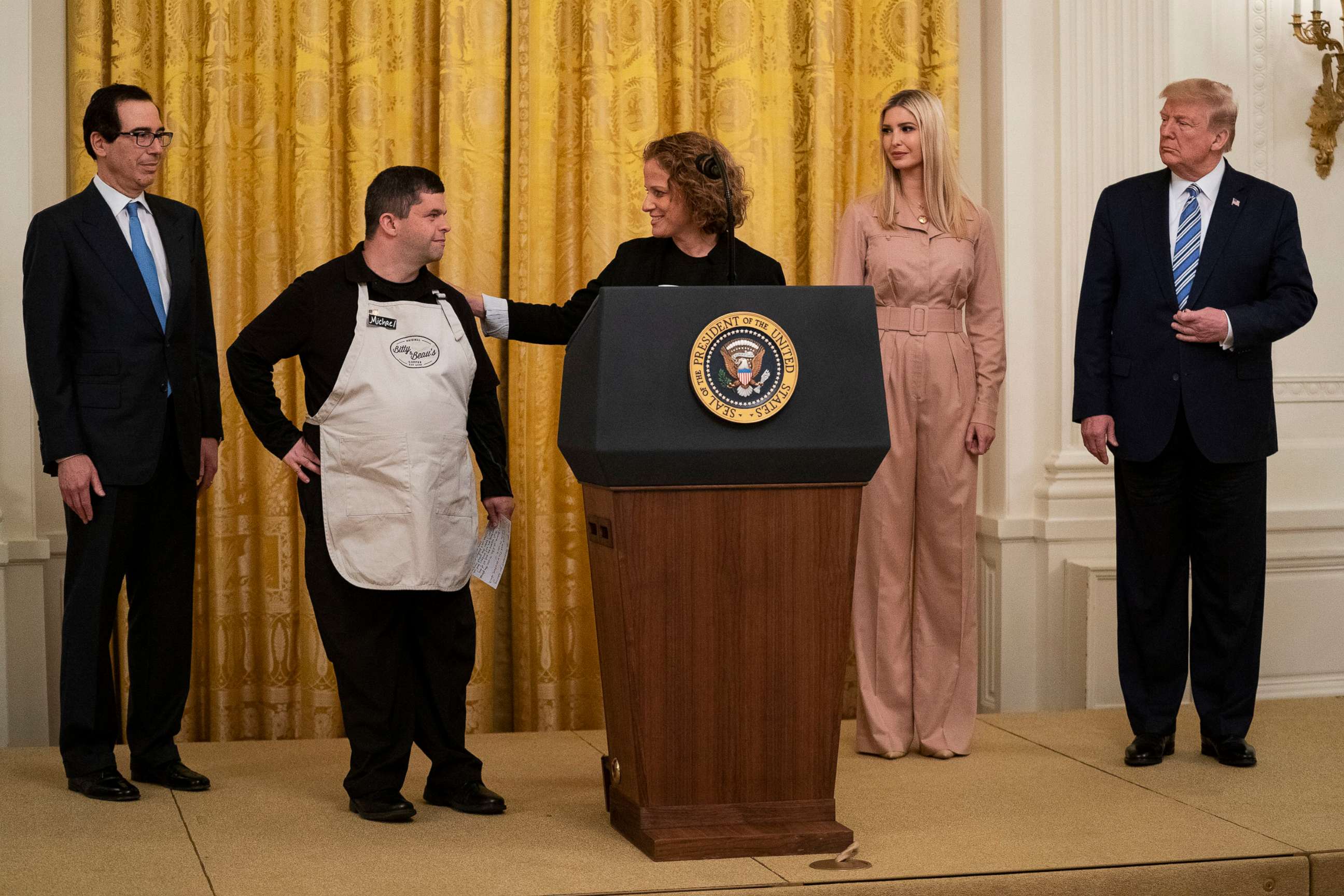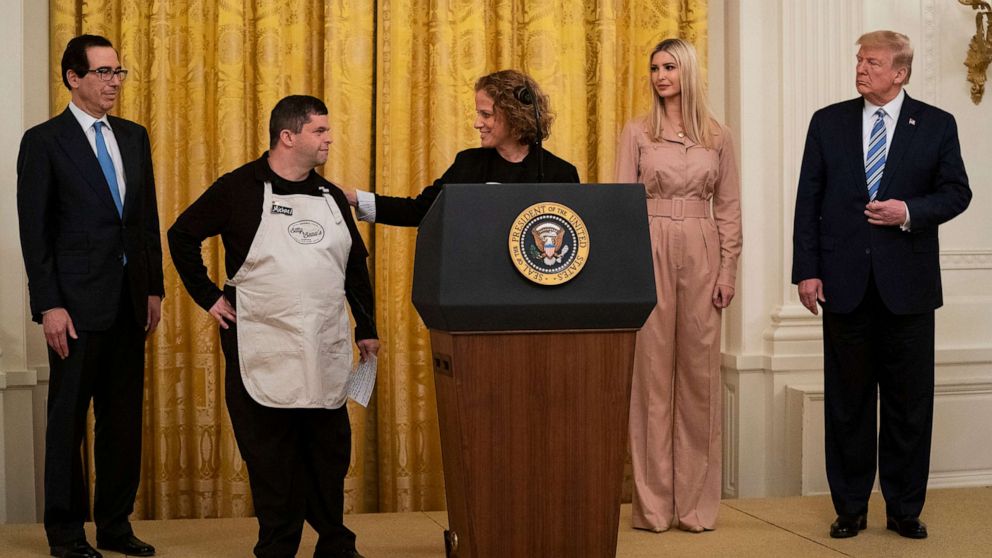For coffee chain Trump heralded as model of payroll rescue, anxious days after federal funds run dry
President Donald Trump invited the owners and some staff of a family-owned coffee chain that employs adults with disabilities to the White House in April to be heralded as the best face of the Paycheck Protection Program, the federal financial rescue meant to help small businesses survive the coronavirus pandemic’s terrible economic toll.
In the East Room, wearing his coffee shop apron, employee Michael Heup told the president, “At Bitty and Beau’s, we like to use the phrase called, 'Not broken.' That means me and all my amazing coworkers are not broken and we have lots to offer. I know the great country of the United States isn’t broken either.”

Eight weeks of federal loans enabled Bitty & Beau’s to keep Heup and his colleagues employed, even as the shops themselves were shuttered. But now the federal support has stopped. And like many companies that benefited from the $669 billion federal program meant to bridge the gap while the nation hunkered down, Bitty and Beau’s Coffee has been forced to retrench after a cautious reopening.
“At this point, financially, it doesn’t make sense to have everybody back at full steam when we don’t have the customers back in the shop yet,” said Amy Wright, who co-founded Bitty and Beau’s with her husband Ben after two of their four children were diagnosed with Down syndrome.
“There’s a sliver of me that was hoping that we would prove everybody wrong, and this would be the one place that people would just pour back into,” Wright told ABC News. “But the reality is, it’s still a scary time.”
The nation’s top financial experts have been clear that it is too soon to know when and how the country will bounce back financially. Federal Reserve Chairman Jerome Powell said in late April that he remained hopeful the government loans and grants would help.
“This direct support can make a critical difference not just in helping families and businesses in a time of need, but also in limiting long-lasting damage to our economy,” Powell said.
But as the pandemic has dragged on, moving around the nation in hot spots, the economic uncertainty remains.
Rep. Katie Porter, a California Democrat, told ABC News the federal rescue was intended to allow businesses to make payroll at a time when they had no revenue coming in – and it achieved that, at least so far.
“I think for many businesses… it was a lifeline,” Porter said. “One of the challenges we face is we didn't know and we still don't know how long this pandemic will last.”
More federal help could be coming. Treasure Secretary Steve Mnuchin said Tuesday that discussions regarding potential additional funding for small businesses are underway. But for now, Bitty and Beau’s, like so many other businesses, is preparing to weather the storm on its own.
Bitty and Beau’s, which opened its first store in 2016 and now has five locations in the South and Mid-Atlantic, surfaced as an applicant for the support early.
The coffee chain employs people with intellectual and developmental disabilities and advocates for greater societal inclusion of people with such disabilities. During the lengthy coronavirus shutdown, Wright made an early decision to shut the doors.
“When we first learned about the pandemic, of course, our minds and our hearts went straight to our employees and worried about their health,” she said. “A lot of them have preexisting conditions. So we were very careful and delicate with dealing with that.”
At the same time, Wright said many of the 120 employees were working in their first jobs, ever, and had just begun to experience the joy of taking home a paycheck. The task of sharing the news that, for their safety, they would have to close down, was crushing.
“The uncertainty of what would come next was, I mean, there were a lot of emotions happening,” Wright said.
As the payroll support program took shape, the company’s local bank began helping to guide them through the process. In order to adhere to the rules, Bitty and Beau’s had to maintain its payroll, even as the coffee shops were shut.
Pouring their energy into their online business, selling ground coffee, t-shirts and other products, Wright assigned the staff to work from home penning hand-written thank you notes for every order shipped out.
The loan would last eight weeks. The hope, she said, was that the nation would reopen before the federal support ran out.
“When everything goes dark in the beginning and you are struggling to find a piece of hope for your business surviving and you see that light at the end of the tunnel,” she said, “even if it's just for two months, it was a risk worth taking for us.”
Last month, as the end of that period drew near, and the spread of the virus appeared to be waning, Bitty and Beau’s, slowly began to reopen shops. They opened the flagship store, in Wilmington, North Carolina, and the store in Annapolis, Maryland, where Heup roams the counter greeting guests, making coffees, and changing cash at the register.
Even as all five stores opened, the steady flow of customers that once livened the stores did not follow.
“It has been extremely slow,” Wright said in early June. It has been especially hard on the employees. While some, like Heup, are back behind the coffee counter, others have been asked to sit tight.
“We've basically just said, please hold,” Wright said. “We will bring you back as soon as business supports that. And that's hard. I mean, they're all excited and ready to get back to work.”
Like so many businesses that are now waiting, anxiously, for the nation to fully reopen, Wright is remaining upbeat about the potential for her coffee shop business to one day come roaring back. She and her husband, she said, “are in this for the long haul.”
“And we will make this work,” Wright said. “We will leverage ourselves personally to keep things going. Because it matters that much to us.”
ABC News reporters Ben Siegel and Kate Holland contributed to this report.




